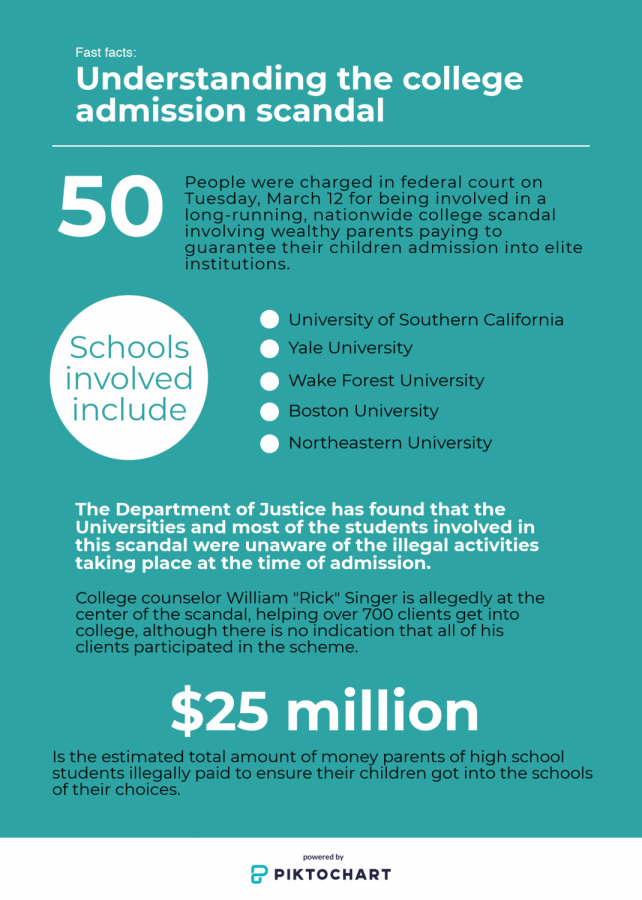College admission scandal steals opportunities, reveals superficiality of higher education
The college admissions scandal sheds light not only on the corruption and greed behind those who cheat their way into top-tier institutions but also on the flawed thinking that a prestigious college or university guarantees a lifetime of success and happiness.
March 21, 2019
Over 50 people were indicted by federal officials on Tuesday, March 12.
These people won’t be on trial for stealing money. In fact, they’re being arrested for doing quite the opposite: these were wealthy people spending exorbitant amounts of money to ensure their children admission into selective colleges and universities. These people were arrested for stealing opportunities.
Entry tactics ranged from obvious ones, such as blatant cheating on standardized tests and bribes straight to admissions officers, to more creative routes, including creating fake athletic profiles for students who didn’t actually participate in sports, and then paying off coaches to convince admittance officers to accept these “star athletes.”
The charges against those allegedly involved include counts of conspiracies related to racketeering (crimes committed through extortion or coercion) — for which the maximum penalty is a fine of $25,000 and 20 years in prison in addition to the forfeiture of all business interests and gains from the criminal activity. Some individuals were indicted for wire fraud (financial fraud using telecommunications), which could lead to up to 30 years of jail time. Compound those charges, and some offenders are facing over 50 years in prison.
According to the New York Times’ article “Here’s How the FBI Says Parents Cheated to Get Their Kids Into Elite Colleges,” this is the largest college admissions prosecuting the Justice Department had ever seen. Over 200 federal agents were called to action to investigate. Famous universities including Yale, University of Southern California and Georgetown are being scrutinized for their involvement. It’s all over the news. And especially at Algonquin, where many students are dreaming of someday attending one of the universities involved in this scandal, people are rightfully upset.
But while it is disappointing to see this messy web of college admissions fraud, it’s not surprising. People with money often get what they want, even if maybe they shouldn’t. We’ve all seen it before: wealthy people paying their way out of crimes, forcing themselves into positions of power and influence. It’s something our society has grown to expect and, largely, accept.
Still, this scandal in particular is hard to digest. So hard to digest that, according to a CNN article, “Students and Parents Pursue Class-action Suit Against Universities Linked to Admissions Scandal,” a group of seven students and parents are actually suing schools for rejecting qualified individual candidates in an admissions process “warped and rigged by fraud.”
In America, education is supposed to be the great equalizer. No matter how humble your beginnings may be, these prestigious universities are coveted pathways to success. The hope is, the bigger the name of your school, the bigger the paycheck you’ll get at your first job after school.
And the best part? If you work hard enough at your free public high school, and you get the best grades, and you join that academic club, and make that varsity sports team and craft that essay to the point of sheer perfection, you, yes YOU, have a very good shot at getting into a prestigious school, graduating with a fancy degree and making a good life for yourself.
Part of the problem lies in this very concept. Even if you are admitted to one of these universities, there is still no real guarantee of automatic success or happiness. These things are equally achievable, not to mention just as fleeting, as they would be if you attended a less prestigious school.
And the students involved in this scandal were fully capable of getting into a fine college and receiving an education without any cheating along the way.
Perhaps the worst part of all, some of the students didn’t even care about the schools their parents bought them into. Actress Lori Loughlin’s daughter Olivia Jade Giannulli has become notorious for publicly announcing that she doesn’t even care about school; she just wants to party and go to football games.
With an attitude like that, I find it unlikely at best that she actually fully immersed herself into her learning and her education. Most, if not all, of the students whose parents scammed their way into college probably failed to get the most out of their educational experience. If they weren’t hardworking and talented enough to get into these schools by virtue of their own achievements, they probably will not snap into shape when placed in the high-pressure, academically taxing classes offered at these prestigious universities while surrounded by genuinely talented students.
Not to mention, for other students attending universities involved in the scandal, I imagine it simply feels bad when you work so hard for something and then somebody else strolls along and snatches the same prize with a mere fraction of the work. It feels even worse when instead of taking an identical copy of your prize, they rip the thing you worked so hard for right out of your hands and you’re left with nothing except a letter beginning with “We regret to inform you.”
On the other hand, it’s hard to criticize anyone involved in this too much, because realistically, if everyone at Algonquin had as much money and power as Loughlin, there may be more that a few kids in this very town who would bribe their way into college, too.
Any student who has cheated on homework or a quiz has already proven they are capable of doing morally questionable things in order to improve their chances of future success. If you had $1,000,000 and a 1550 on the SAT cost $1,000, it might not seem like too bad of a deal. You might not even consider the fact that you were taking someone else’s spot.
Part of the reason that we as a society have come to expect wealthy people to abuse their power is because it’s so easy to do. If you could pay for everything you’ve ever wanted, why wouldn’t you?
In the land of opportunities, it is surprisingly easy to buy your way to success. But when people do, it hurts those without that kind of privilege immensely. It keeps the upper-class powerful and prevents honest, hardworking people from ever improving their status. What we can’t do is continue to behave like cheating the system simply for a name will produce smarter, more successful children.
Instead, parents need to stop focusing on the name of the school and start encouraging students to study and learn as much as they possibly can no matter where they end up. And students should take some pressure off themselves too.
The lucky few who are talented and persistent enough to earn acceptance into elite universities have every right to jump on those opportunities, and they will thrive. But students who get into state schools and community colleges should be just as proud and excited, because they too have a chance to receive the knowledge and skills they will need to do incredible things.












Charles Giangarra • Mar 23, 2019 at 10:30 pm
Superb article. Truly points out the real purpose of success in education. It’s not the school it’s the effort the person places on their education. You get out of it what you put into it not what’s given to you. As the others said this writer will have no problem being a success in her life
Ms.Linda DeMeo Pipitone • Mar 21, 2019 at 9:54 pm
Excellently written article about what I believe to be a fraudulent practice among the rich that has been going on for decades. The writer also focused on what real priorities there should be for students to achieve and aspire to and for parents to be supportive of !
Tony Ruggi • Mar 21, 2019 at 7:50 pm
Excellent article, direct and to the point, and what a point it made. Hope everyone reads this well written article and fully understands its gravity. The writer has shown, with such talent that she should have no problem getting into an elite school should she so desire, without any need for cheating.